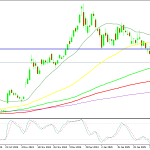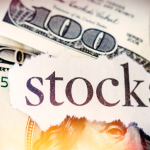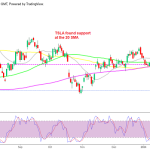Last Updated: Jun 30, 2025 03:15:10 PM (GMT)
TSLA/USD: The current market price is 327.63, reflecting a negligible change of +0.066% from the previous close. Support and Resistance Levels Key support levels are 325.8, 324.91, and 324.49, while resistance levels are 330.45, 331.48, and 332.0. The pivot point is established at 326.5. Indicators The RSI is at 36.52, indicating possible oversold conditions. The ADX shows a value of 47.15, suggesting strong trend strength. The ATR is 1.75286, indicating volatility, while the 50-day SMA is at 325.3 and the 200-day EMA is at 324.56. The Parabolic SAR indicates an uptrend at 327.63. Market Sentiment The market price is above the pivot point (326.5), supported by bullish indicators, suggesting a bullish sentiment in the near term.
Tesla Stock Info
Tesla (TSLA) is a leading electric vehicle (EV) manufacturer and clean energy company that has garnered significant attention from investors in recent years. In this article, we will provide an overview of TSLA's stock performance and its technical analysis.
Tesla Stock Price
As of April 2023, TSLA's stock is trading at around $800 per share, with a market capitalization of around $510 billion. The stock has experienced significant volatility in recent years, with a year-to-date return of around 25%.
TSLA Forex
Investors who are interested in trading TSLA's stock in the forex market can do so through various financial brokers and platforms. Forex trading involves buying and selling currency pairs, and TSLA's stock can be traded against a variety of currency pairs, including the USD, EUR, and GBP.
TSLA Technical Analysis
Technical analysis is a popular method used by investors to analyze a stock's price movements and identify potential trends. When conducting technical analysis on TSLA's stock, investors may consider a variety of factors, including the stock's moving averages, trading volume, and support and resistance levels.
As of April 2023, TSLA's technical indicators suggest that the stock may be experiencing an uptrend. The stock's moving averages are trending higher, and its trading volume has been consistently high in recent months. Additionally, the stock's support levels are relatively strong, which may suggest that the stock is currently undervalued.
Tesla was one of the numerous Nasdaq stocks to experience a major dip in value. Despite this, the electric car manufacturer remains highly lucrative. Moreover, its attractive valuation positions it for potential long-term success. As the most profitable short trade in the U.S. market in 2022, Tesla generated $15.85 billion in paper profits for investors. This marked the most successful year ever for Tesla short sellers, though they have recovered only about 25% of the estimated $60 billion losses from 2010 to 2021 as of 6 January 2023.
Tesla is undeniably dominating the automotive industry, having recently become an incredible profit machine. In the third quarter of 2020, total revenue rose by an impressive 56% to a staggering $21.45 billion while net income doubled to $3.29 billion. This impressive feat was especially remarkable given that Tesla's largest rival, Toyota, which still largely produces gasoline-powered vehicles, could only generate $3.15 billion in the same period despite selling seven times more vehicles than Tesla did, according to Nikkei Asia. This is indicative of the vast potential of Tesla's electric vehicles and its innovative approach to automobile manufacturing and design - showcasing its ability to revolutionize the industry and set it apart from its peers.
Tesla is facing increasing competition in the electric vehicle (EV) market, which will likely lead to its profit margins being eroded. Adding to this challenge is the looming risk of a recession, which could have a devastating effect on all automakers. Nevertheless, Tesla remains in a strong financial position due to their history of fiscal prudence and proven track record of success. The growing strength of the US dollar might be bad news for investors but the automaker seems enthusiastic to make profits.
Factors that influence the price of Tesla stock include industry competition, company performance, macroeconomic factors such as inflation and interest rates, investor sentiments, news and events.
Sidebar rates
- <% signal.pair %>




